Caveat in the Club
Caveat in the Club
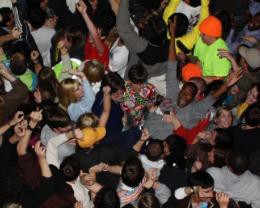
Do you know where your children are… getting healthy by blowing off steam?
The health rave is a place to freak out, to get swept up in the emancipated spirit; it’ll get you riled up enough to dance like an idiot, to do somersaults and swing on a rope over a bunch of strangers and not give a hoot who’s watching. It offers you an opportunity to just be yourself, unbound by the repressive mores of the world outside.
But? But.
But it confines transgression to a padded room where no harm can be done and where nothing gets in the way of the penetrating force of productivity. In fact it channels nightlife’s wasted libidinal energy and converts it into a force for spiritual, emotional, and physical self-optimization. Rather than wasting the value produced — spilling it like sperm on the floor — the health rave saves and harnesses that expenditure, streamlining the ritual for optimal results.
Intentionally enjoying yourself is a nightmare. (Photo via Morgan Harrison.)
New York City, September 3, 2014
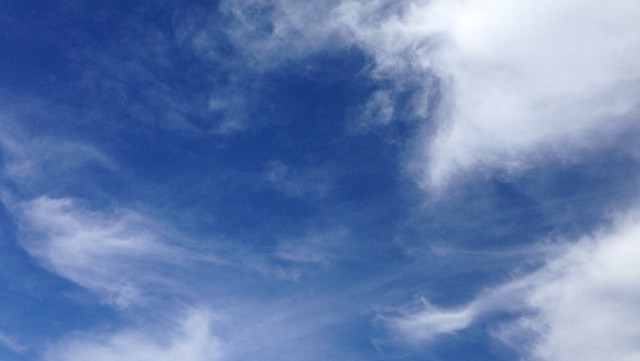
★★★★
Smells moved individually on the air currents, rather than hanging together in one stale accumulated stench. The sun had a little sharpness to it, but high clouds screened the worst of it and it no longer had the angles to unleash its full power. Summer’s late bid at awfulness had collapsed like all its previous attempts. The roof was pleasantly warm, mingling with moments of pleasant coolness. Ample late light reflected gold here, copper there. Only in the subway platforms and the apartment building’s back hallway was the air still close and hot.
CFCF, "Prisma"
CFCF flirts with ambient music but usually stops short of becoming it. So “Prisma,” CFCF’s contribution to a forthcoming ambient compilation, is a pleasant surprise: a loose, cyclic drone that floats somewhere between New-age spa music and William Basinksi’s Disintegration Loops.
How to Say Hello in American
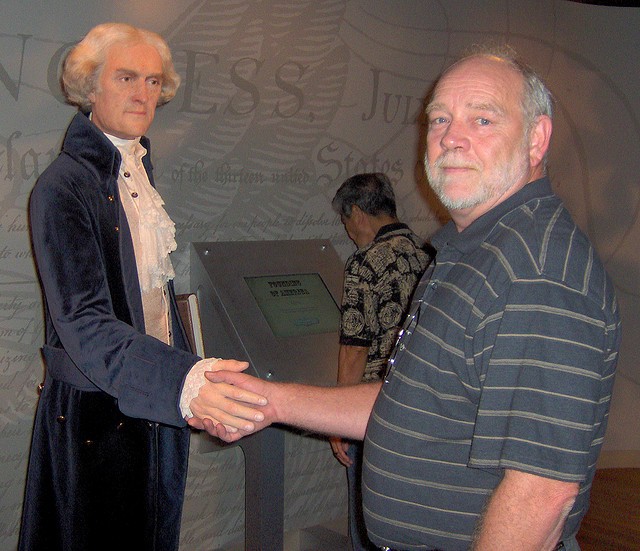
My mother is big on politeness. Recently, before a long trip with my girlfriend’s family, she wrote me a letter outlining the things I should remember to do: stand up straight, hold open doors, and rise when ladies approach the table. “I could go on and on,” she wrote, wrapping things up. “Just please reread the etiquette book I got for you in highschool.”
I did not reread the etiquette book. I trust my own sense of decorum, particularly while on vacation; I’m good at vacations. I’m also a thirty-one year old financially independent human who has lived several time zones away from my mother for over a decade. But a short time after returning from that trip, my girlfriend and I moved from the city where we’d met and spent our entire professional, semi-adult lives, to a different one, across the county, and I wished I had reread it. I’ve come to realize that the thing about moving to a new city and meeting lots of strangers who might, eventually, become my friends — or people I have only interacted with on the internet but are kind of friends there — is that no one knows how to greet anyone anymore.
This is a uniquely American problem. Europeans, and countries colonized by Europeans, have the cheek kiss. In Russia, apparently, the aim is to crush one another’s knuckles when meeting. Japanese people have at least five degrees of bowing. I didn’t know about all of the different degrees until very recently, when the vague and indeterminate methods of American greeting fully crystallized. I was having lunch with an old friend who had just moved back after five years in Tokyo. I asked him what was the weirdest part about returning. “Figuring out how you’re supposed to say hello to people,” he said immediately. He then explained the varieties of bowing, which, honestly, sounded fantastic. What clarity: a nod for those you know well, a little more than a nod — kind of full bow but not quite — for peers, and on down to serious bows for serious times, all the way to the floor.
There is no standard American greeting. There never has been. George Washington’s 1748 “Rules for Civility and Decent Behavior in Company or Conversation” is a good place to start, though it’s really a translation of rules put down by French Jesuits, compiled by a sixteen-year-old Washington. There are many rules about when to speak and when not to speak, when to stand and when to remain seated, and when to shake your head, leg, foot, or eyes. (The answer is never.) There’s also a lot of spit talk: “Spit not in the Fire…bedew no man’s face with your Spittle…if you See any filth of thick Spittle put your foot Dexterously upon it”. C. Dallett Hemphil, a history professor at Ursinus College, writes in his book, Bowing to Necessities: A History of Manners in America, 1620–1860, that the problem with standards of etiquette in the United States has always been about the tension between the aristocracy and the middle-class. Manners first came from and were codified by the elite, who were protected by them; Americans have been anti-elite from the outset, which is probably why our founding father spent so much time discussing what to do about spit.
The most thrillingly blunt modern advice on the topic of American salutations can be found on eDiplomat, which gives away some major cultural secrets, like that “see you later” is just an expression; people say this even if they never plan to see you again. “When saying good-bye, Americans may say ‘We’ll have to get together’ or ‘Let’s do lunch.’ This is simply a friendly gesture,” eDiplomat advises. “Unless your American colleague specifies a time and date, don’t expect an invitation.” As for greetings: “American greetings are generally quite informal. This is not intended to show lack of respect, but rather a manifestation of the American belief that everyone is equal.” The Emily Post Institute also doesn’t give many hard and fast rules here, but handshakes are for everyone, even close friends and relatives, with a hug thrown in for good measure. Awl-pal Juliet Lapidos has weighed in on the hug, particularly for goodbyes, and found them wanting. “There are several hug alternatives, among them: the handshake, the cheek kiss, the wave, the arm squeeze, and the nod. Handshakes seem formal, cheek kisses un-American, waves rather odd. Arm squeezing (warm, but not falsely so) would be a good solution if it weren’t for the danger of getting pulled into something more full-bodied.” She likes the nod, and so do I, but, after further consideration and some trial and error, I want to suggest that the handshake — firm but not too firm, arm slightly extended but not thrust out — is the best and most American greeting we’ve got.
It may be too formal, or it could turn into something more intimate than you bargained for — a hug, perhaps. Maybe it’ll turn it into something more sanitary and snappy, like a fist bump, or that other great American greeting, the high five. Maybe there’s no response from your partner-in-shake and the gesture turns into a cartoonish wave and you’ll both laugh about it later. Or you will never see this person again. Or if you do, you will not care, or remember this moment. That’s the beauty of the handshake. It is but a hand extended. An offering awaiting the other person’s response. One half a handshake is equality manifest: it can become anything.
When I was home, I mentioned the note, and the etiquette book, to my mother. She laughed it off and said it had all been a joke. Maybe. She still is big on politeness, and she almost certainly bought me an etiquette book in high school. I remember all the arguments (she would call them “discussions”) we had regarding the nature of decorum. If you rush to a door to hold it open for a lady, are you really being polite? Or are you merely making a show of it? We agree on handshakes, though, and I intend to follow that, even in this place, Los Angeles, where grown men often dress like nine-year-olds, full-length pants are scarce and sleeves even scarcer. If we meet, I’ll probably put my hand out and smile. Do with it what you will.
Ryan Bradley is a writer and editor newly arrived in a sunny land of children.
Photo by Erin Webb
Greeting the World's Largest Dinosaur, Then and Now
Now:
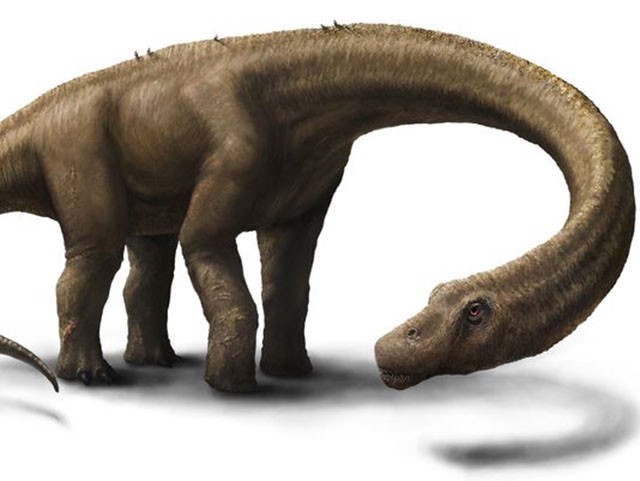
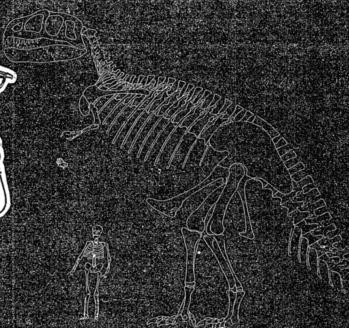
Now:
“Dreadnoughtus schrani”
Then:
“Tyrannosaurus Rex”
Now:
It stood two stories high at the shoulder. Its tail was almost as long as a city bus. And it tipped the scales at some 65 tons — heavier than a fully loaded semi-truck.
Meet Dreadnoughtus schrani, a newly discovered dinosaur and one of the most massive land animals of all time. And it’s not just a heavyweight. Never before has anyone found so many representative pieces of a super-large dinosaur.
Then:
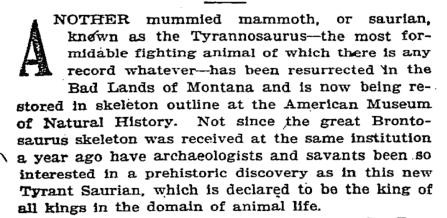
Now:
Whether it was the biggest or only the second-biggest dinosaur, Dreadnoughtus was unimaginably large and imposing. Though a plant-eater, it came equipped for battle with a muscular tail it could have used as a weapon and large claws on its back feet. Its size would’ve made it the king of the forests where it lived in the late Cretaceous.
Then:
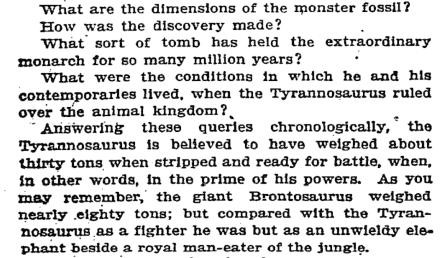
Now:
“If this thing just leaned on a T. rex, it would probably kill it,” Lacovara says. Walking up to it “would be like approaching a living building. … It would be a pretty overwhelming moment, and not advisable.”
Then:
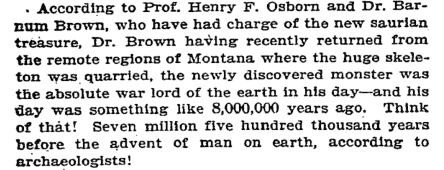
Now:
Though it could laugh off all comers, even Dreadnoughtus was not immune to the power of a river in full flood. Some 80 million years ago, a raging torrent swept away two Dreadnoughtuses — perhaps already dead — before dumping them on a bed of quicksand-like sediment.
Then:
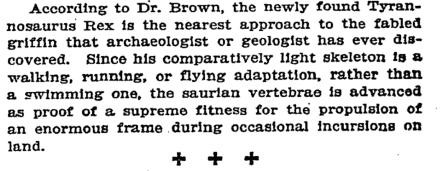
Now:
“This is a truly huge animal,” Lacovara says. “It kind of staggers the imagination.”
Then:
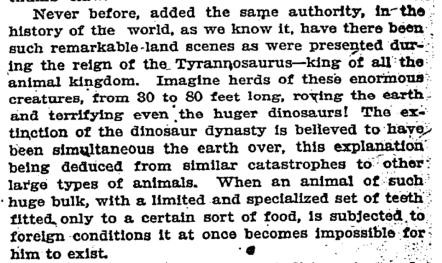
Visual Poems by Anthony Madrid and Mark Fletcher
by Mark Bibbins, Editor
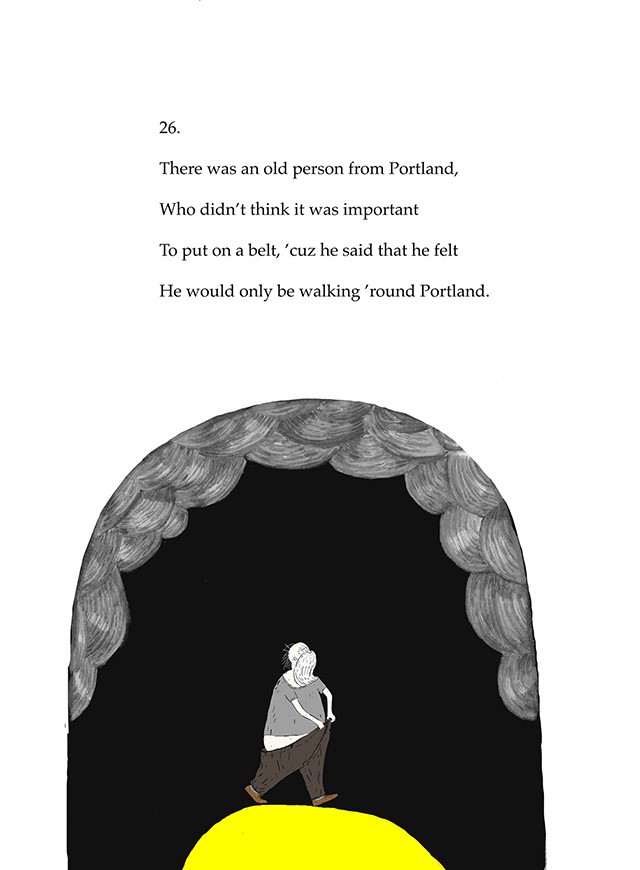
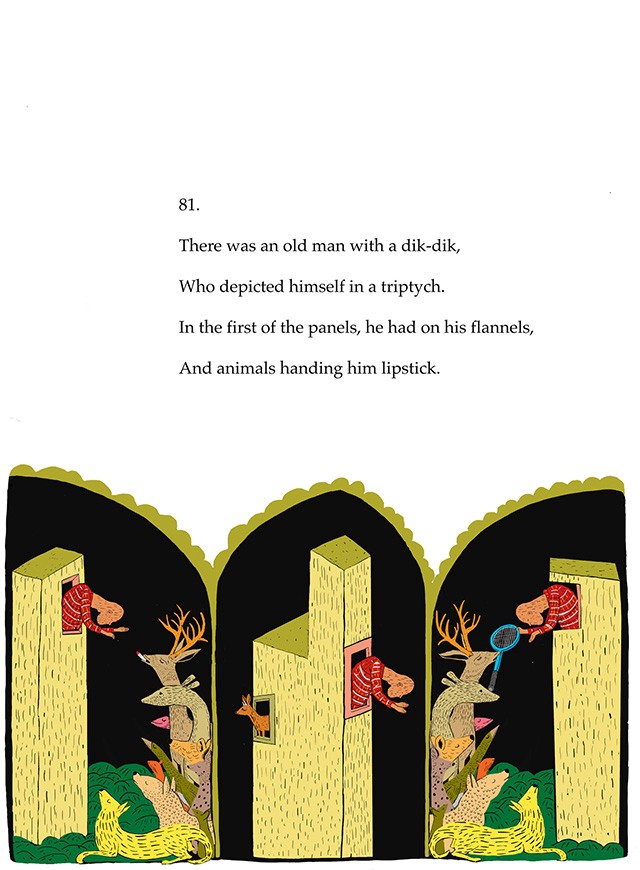
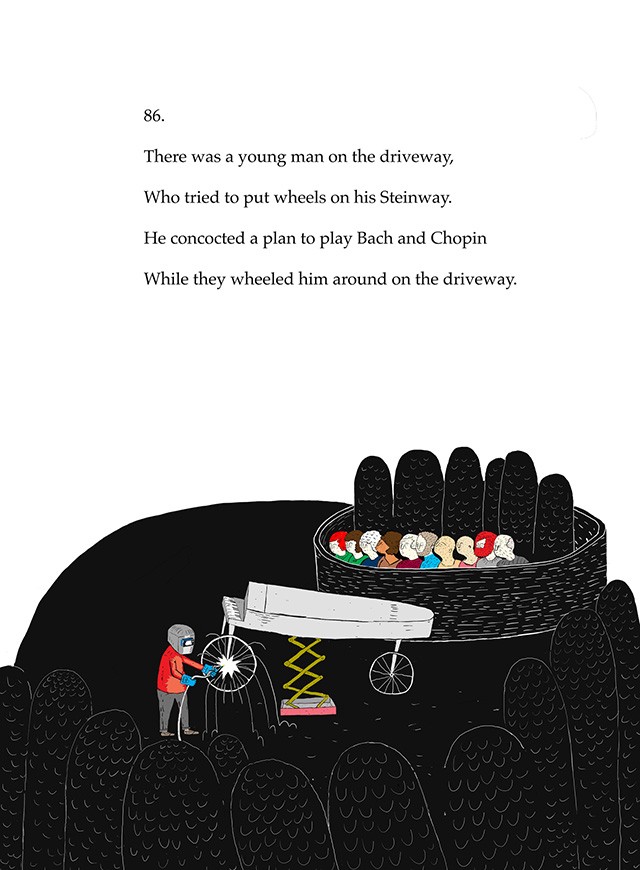
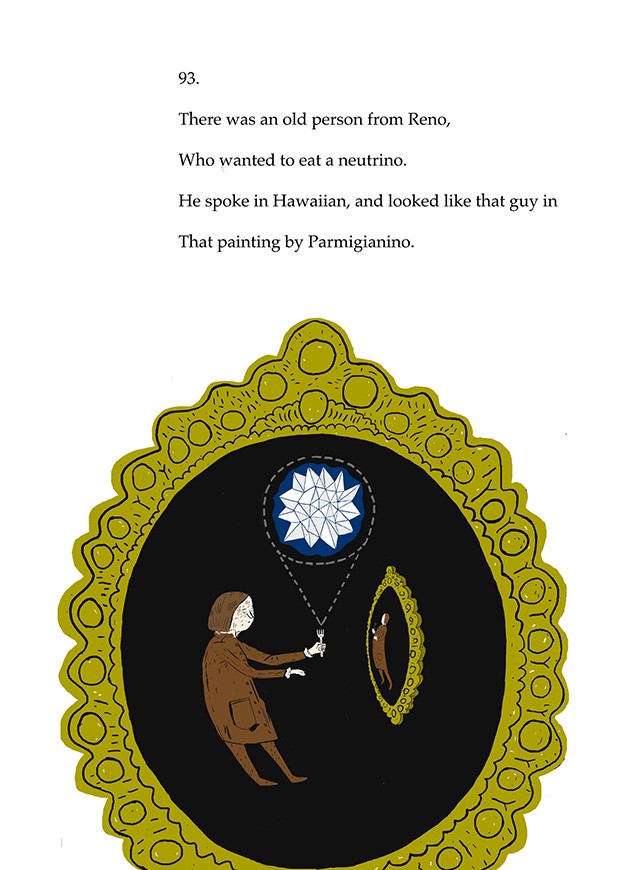
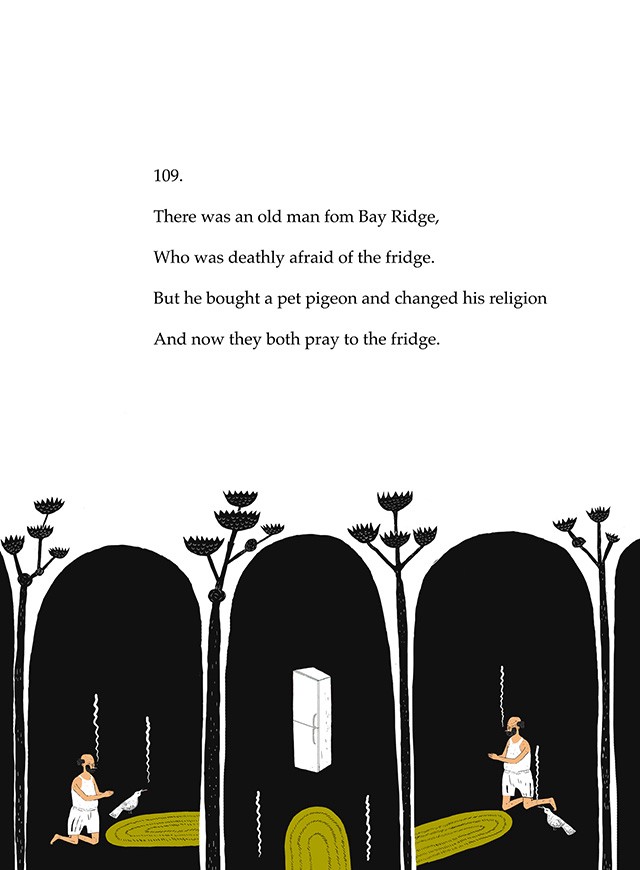
Anthony Madrid lives in Chicago. His poems have appeared in The Best American Poetry 2013, B O D Y, Boston Review, Fence, Lana Turner, LIT, and Poetry. His first book is called I Am Your Slave Now Do What I Say (Canarium Books, 2012).
Mark Fletcher is an illustrator and cartoonist. He designed the cover for Anthony Madrid’s book I Am Your Slave Now Do What I Say. Mark earned his BFA and BA in Art History from the University of Colorado. He lives and works in Colorado Springs, Colorado.
You will find more poems here. You may contact the editor at poems@theawl.com.
Welcome to Beautiful Laniakea! The Water Is Void and You Are Nothing
Astronomers have mapped the cosmic watershed in which our Milky Way Galaxy is a droplet. The massive structure, which the research team dubs the Laniakea Supercluster, extends more than 500 million light-years and contains 100,000 large galaxies.
For everything you have ever known, and all other things too, a slight rebranding.
The Queen and Her Thrones
This year’s event had 70,000 attendees. To service their basest bodily functions, Black Rock City was home to 1,400 porta-potties for the “general population” as well as 200 porta-potties for what Robbi called “Entitlement Camp,” or festival-goers who rent their own private unit…
Complaining about the festival’s fetid porta-potties has almost become a team-building exercise for pre-billionaires. “They’re not necessarily rich,” RobbiDobbs told me. “Nearly most of them are rich and entitled. That’s why I used the derogatory term of ‘entitled.’ I think everybody should shit in the same place. What’s your fucking problem? Shit in my units!!!!” She laughed.
A story about feces that you might actually want to start; a story about Burning Man that you might actually finish.
New York City, September 2, 2014
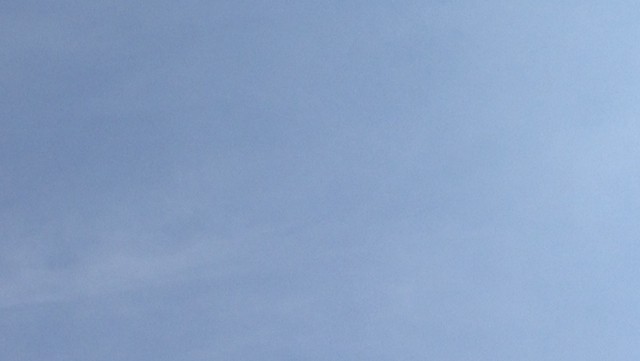
[No stars] The long-lost dog days had trotted up to the door, weeks late and unapologetic, smelling of decayed things they’d rolled in. Overhead was a bleary mix of haze and thin unbounded cloud. A blinding glare reflected off oncoming cars and the surface of a grime-speckled curbside puddle. Production-crew workers were sticking greenery into the chain-link fence around the non-public garden, till it combined with the flourishing street trees to present a sinister jungle lushness. By midday the sky had settled out into blue and white, and the heat had not gone much beyond the earlier unpleasantness. Visible haze had abated at rush hour, but the air was thick and dead. Down in the subway, the atmosphere was nauseating, unbreathably thick and laced with rot and air freshener, or rotted air freshener. Worn-out sunflowers leaned against a community garden fence, and behind them were dead brown corn stalks and ragged-looking broccoli. Out in the night, the air had begun moving, but it was no more refreshing than the stagnant air had been. On the way back from the supermarket — with bags of near-overripe fruit and dispiriting vegetables — a sustained wind blew up the avenue, hot and full of construction dust, raising a heavier sweat to catch and hold the flying grit.
Escape Artist Tells All
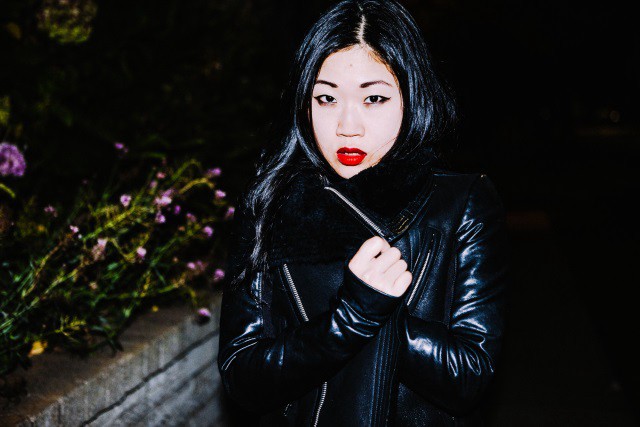
Awl pal Mary HK Choi managed to make a certain kind of dream come true: She left New York. And now she has a thing she wrote about it, a thing that you can and should buy. Let’s learn more!
Balk: Mary HK Choi, you have a new thing you wrote called [KINDLE SINGLE TITLE TK]. Tell me about it!
MHKC: I do, it’s called Oh, Never Mind and it’s a collection of essays. It’s not a book. It’s more like a booklet. Or maybe a pamphlet??!!! ANYWAY, it’s 5 essays that are new. They’re a buck ninety nine. Like, an US Weekly when they were competing with In Touch. Or whatever. It’s about me leaving New York because that’s what happened to have happened while I was writing them.
Balk: Mary, how on earth could anyone leave New York? And b) Why does everyone who leaves New York have to write about it?
MHKC: I love New York but sometimes New York is so mean to you. And I needed a level up. Los Angeles is a decent level up because they pay you lots and lots of money for whatever you’re verbing for them. The thing about leaving New York is that you can come back. This way you don’t have to tread water and cry and feel a low-grade panic attack the whole time. I think this last winter broke my fucking brain.
b) Because we’re all assholes and because it’s the craziest feeling to leave New York. It does absolutely feel like capitulation because you didn’t WIN at New York to where you own a million dollar brownstone that now costs 4 million or whatever. But it also feels like breaking up with everyone you’ve ever loved all at the same time. It feels like you’re going on the spaceship to colonize another planet or something. It feels completely fucked up and scary and incorrect to leave this place. and some of us just gotta workshop that shit plus, also, it’s this THING to where if you don’t win; you age out. I wanted a car and a house and a washer and dryer. and it’s #basic as fuck to want those things but I got too old to care about how it seems. I have made a huge mistake. Probably.
Balk: Okay, I can see that. I can even MAYBE A LITTLE SOMETIMES (but particularly after this winter, which was brutal) think that possibly New York might not be the best place to grow old and die in. At one point during this HORRIBLE winter I was talking to a friend who was trying to decide whether she should stay here or go to California and I was like, “You know what? If you’re not FROM HERE there’s no reason you have to stay here.” Like, for me, I don’t think there is any other choice, if I’m being realistic. What am I gonna do in America, say “hi” to my neighbors? Drive around with a smile on my face and wait for the good movies to come to me three months after they get released? Go eat at Chili’s? Let someone finish their sentence? I’m stuck. But people like you and my friend, who did not grow up knowing that this is the pinnacle of civilization, have options. Still, LOS ANGELES? I cannot even comprehend. We’re not kids anymore, isn’t it a little late in life to have to learn, like, when to avoid Wilshire Blvd, or what the different degrees of plasticity mean, or a whole new language of how people are actually saying “fuck you”?
MHKC: Here’s the LA hack: my friend calls it “rehab.” You’re living your life as an avatar. I keep calling it purgatory or a fugue state because NOTHING YOU DO THERE MATTERS. Nobody gives a single solitary shit about you. Do you know what it feels like to live your life NOT conjuring clever observational little things to say?
Balk: I’ve seen ‘Big Bang Theory’
MHKC: There’s something about NY that feels like IRL Twitter sometimes, and I’m not saying that to be uncharitable.
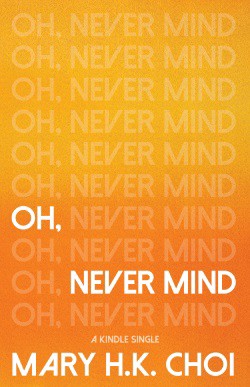
Balk: So it is like a sheer but sunny existential reality? All is meaningless, but the weather is nice?
MHKC: The weather feels like psychotropics.
It’s not that I’m done with New York. I love you fuckfaces who are all trapped here. But don’t you ever think that if you had a few months somewhere else, as a re-up or another gestational period, that you’d have to energy to do this place again?
Balk: Eh, I get itchy after three days away. But I also tend to go to places where no one gives you the finger or calls you “cocksucker” just because you walk too slowly, so maybe that’s part of it.
But what is almost more amazing to me than the fact of your breaking free was the way you did it. Like, one week I saw you at a party and the next week I was like, “Does anyone know where Mary is” and they were all “She moved to LA.”
MHKC: Well, you must know who I stole that move from.
Balk: Joan Didion?
MHKC: Ahhaha you know what? The funny thing about Didion is that I’m so ESL that I actually never read any of the Important Essays On Leaving. I know that sounds like people who make movies that steal EVERYTHING from comics and then say, “I never read that graphic novel” but I think if I’d read all of that stuff I maybe would’ve felt too corny about writing about leaving. ANYWAY you’ve gotta soft move, don’t you feel like because: Internet people who make a big deal about leaving are sorta the worst?
Balk: Hate them so much. Did you get a lot of angry reactions or were people more like I’M JEALOUS and I UNDERSTAND and TAKE ME WITH YOU?
MHKC: Some people were angry but that’s OK. I told the people who I saw at least twice a month and it turns out that’s like maybe 10 people.
Balk: Yeah I guess in New York we always imagine we have a much bigger circle but you could go a YEAR without seeing someone and still think you hung out with them the week before last.
MHKC: Totally. And there’s something sorta fucked up and broken about that. It’s the NY spell.
Balk: Because the time it takes this town to grind you into dust is so imperceptible you don’t notice it happening.
MHKC: Yes but also, it’s a pretty kind way of doing it. Here’s the thing: I love the people who make New York New York and that sounds ridiculous. But I’m not so HUNGRY anymore because I am old now. And it feels rad.
Balk: From Camus to Buddha.
MHKC: Like, I fucking earned leaving New York. But I’m also not convinced I won’t be back. I think the real move is doing both.
Balk: Okay, so apart from the fact that you are one of my favorite writers and everything you do is such a goddamn delight, why should people buy this kindle single ($1.99 at Amazon.com)? What’s different from any of the other “LOOK AT ME I LEFT NEW YORK I’M MAGIC” collections?
MHKC: It’s not JUST about leaving New York. It’s about a lot of things. It’s about losing your mind. And buying shit you don’t need. And gyno appointments. And moms. And being Asian and feeling A Way about it. And being a woman and feeling A Way about it. It’s also an experiment I guess. Like WTF Kindle Single. How the hell does that work even? Don’t you want to know if it works? I don’t get it at all so I wanted to try it.
Balk: Man, between you and the new David Mitchell book it’s going to be a season of stuff about being Asian and making gyno appointments. But I will do what you say and buy it and urge everyone else to.
MHKC: Isn’t that JUST want you wanted to kick off Q4?
Balk: I have one more question for you. This one comes from, to anonymize him, let’s call him “a co-founder of my company.” Or her. It could be a her. Anyway: “What does it feel like to always be the pretty one?”
MHKC: Like burning. It feels like burning.
[You know how chats always have the thing on the bottom now that say “This interview has been condensed and etc.?” Well, that, but with a lot less effort. Photo: Jon Snyder.]
